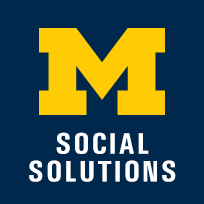 The Center for Social Solutions at the University of Michigan is leading a group of college and university scholars in an effort to examine possible avenues to provide reparations for African Americans and Indigenous people. Reparations refers to compensation, which may include a national apology, educational, housing, and healthcare programs, and financial redress from the U.S. government to Native Americans for genocide and African Americans for the detrimental effects of slavery and beyond.
The Center for Social Solutions at the University of Michigan is leading a group of college and university scholars in an effort to examine possible avenues to provide reparations for African Americans and Indigenous people. Reparations refers to compensation, which may include a national apology, educational, housing, and healthcare programs, and financial redress from the U.S. government to Native Americans for genocide and African Americans for the detrimental effects of slavery and beyond.
The project, which will span three years, creates and leverages a national network of college and university-based humanities scholars working in partnerships with community-based organizations to develop research-informed reparation plans for each location. The network will consist of nine geographically dispersed and organizationally different colleges and universities and involve community fellows as well as local organizations in a collaborative public history reckoning designed to offer tangible suggestions for community-based racial reparations solutions.
In addition to the University of Michigan, the following colleges and universities will be participating in the project:
Carnegie Mellon University in Pittsburgh
Emory University in Atlanta
Rutgers University–Newark
Spelman College in Atlanta
Concordia College in Moorhead, Minnesota
Connecticut College in New London
Wesleyan College in Macon, Georgia
Wofford College in Spartanburg, South Carolina
 Historian Carol Anderson the Charles Howard Candler Professor of African American Studies at Emory University and one of the leaders of the program, stated that “our scholars will be working with community partners to listen and assess the toll that slavery, Jim Crow and its modern iteration have taken on the Black community. They will then work toward crafting a series of policy recommendations for reparations to address those losses. Healing requires accountability. The point is to thrive, not just survive.”
Historian Carol Anderson the Charles Howard Candler Professor of African American Studies at Emory University and one of the leaders of the program, stated that “our scholars will be working with community partners to listen and assess the toll that slavery, Jim Crow and its modern iteration have taken on the Black community. They will then work toward crafting a series of policy recommendations for reparations to address those losses. Healing requires accountability. The point is to thrive, not just survive.”
The project was funded by a $5 million grant from the Andrew W. Mellon Foundation.


These PWIs have the Chutspah to even remotely assume they know what the so-called Black community should have in the form of Reparations. This cabal of PWIs participating in this questionable and narrowly tailored research is indicative of what’s inherently wrong in “White academia”. In other words, these ‘outsiders believe they know best which is furthest from the truth. How is it possible that we have an estimated 105 HBCUs that are filled with experts in every field and you only have Spelman College participating. Really!
Moving forward, based upon the long storied racist history of the University of Michigan towards native born Black Americans, you’re in know position to even remotely pontificating about reparations for Black Americans in any capacity.
In response to HBCU Watch, every scholar serving as a principal investigator for this initiative is not only African American, but are scholars of social justice, anti-black racism, slavery, and inequality. Indeed, some of them are HBCU alums themselves. Is your charge against PWIs meant to smear black scholars, like Carol Anderson and Earl Lewis, also? By the way, this is not a top-down initiative by university administrators. Every element of it came from African American scholars, interests, and initiatives. Thus, there is no “cabal of PWIs” participating in this, but a group of informed and engaged black scholars at R1s, small liberal arts colleges, HBCUs, and state comprehensive universities–public and private. We can either do the work, or sit on our hands…
Before I comment on your emotive response, you need to work on your reading comprehension skills. Point one, I never singled out “Black scholars” (remember to use a capital “B” when referencing Black people. Maybe you get that memo years ago). Point two, simply because one has melanin does not imply he/she will not maintain the intellectual status quo like yourself. Point three, the majority of these so-called Black academics are happily employed at PWIs and probably you as well. Point four, what I find very questionable is the sense of urgency to pontificate about Black Reparations (e.g., for native born Black Americans and NOT Foreign Immigrants). In sum, it’s quite apparent that you’re the product of years of neoliberal miseducation which I find quite abhorent.